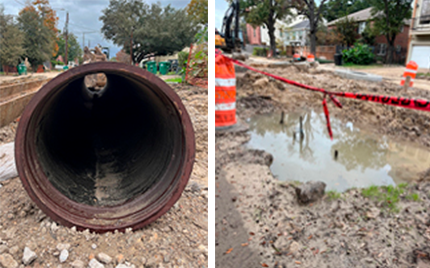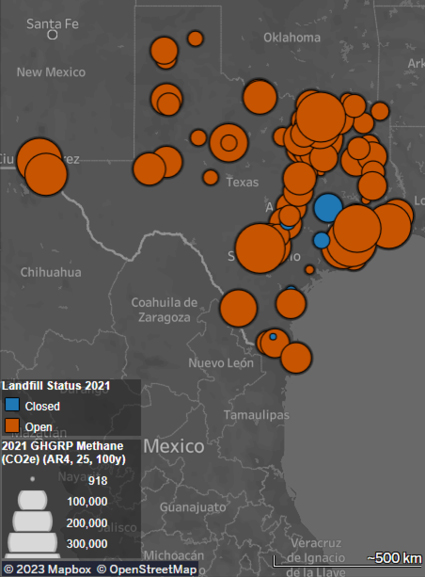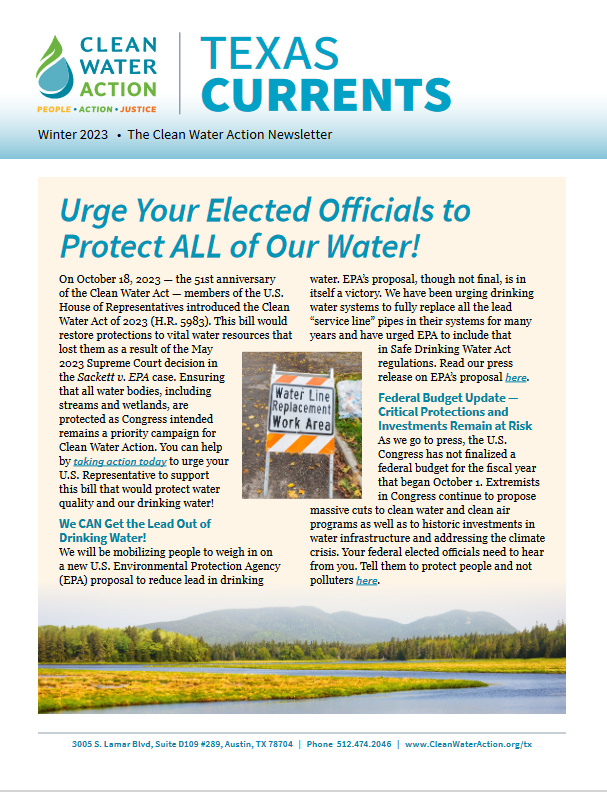In this Issue:
- Injection Wells for Carbon Capture & Storage in Texas
- Sign the petition: Don’t let carbon waste injection poison our water future
- Fall Elections in Texas: How Did the Environment Fare?
- Something’s Rotten in the State of… Garbage! Methane Landfill Emissions in Texas
- Austin I-35 Expansion Concerns
- National News: Urge Your Elected Officials To Protect ALL of Our Water!
Injection Wells for Carbon Capture & Storage in Texas
Clean Water Action has joined the steering committee of a newly formed, statewide coalition in Texas to oppose the upcoming bid by the Railroad Commission of Texas (RRC) to assume control of Class VI carbon dioxide injection wells for carbon capture and long-term storage.
The Railroad Commission of Texas has demonstrated a consistently poor record of environmental oversight of existing oil, gas, and carbon dioxide injection wells, leading to hundreds of thousands of unplugged and orphaned wells which leak and threaten groundwater supplies already.
Efforts to expand carbon capture and storage (CCS) projects are underway in Texas. Our state agency, the Railroad Commission of Texas, already has authority to regulate and permit oil and gas operations, and they currently permit over 54,000 carbon dioxide injection wells statewide.
A different type of carbon dioxide injection project — Class VI carbon dioxide injection wells — is currently regulated by EPA, and the Railroad Commission of Texas plans to request control of these wells in the near future.
Allowing the Railroad Commission of Texas to administer the program for these types of wells presents a new risk to communities’ drinking water. If Primacy is granted to RRC, current and future underground sources of drinking water will be in danger of contamination beyond human use. CCS involves injecting highly pressurized carbon dioxide waste deep into the earth below our communities into wells and pipelines. Without proper carbon injection and storage oversight, water acidification can occur, contaminating underground sources of drinking water with harmful chemicals such as lead, arsenic, and more.
Sign the petition: Don't let carbon waste injection poison our water future!
We urge you to sign the petition to the EPA voicing your concern about letting the Railroad Commission of Texas (RRC) take control of building out carbon capture and storage well projects in Texas without rigorous oversight or proper community engagement. Clean Water Action has joined with other organizations across Texas to share research, evidence, and concerns about RRC gaining control of this newer type of carbon waste injection practice. With your input, we are petitioning EPA not to grant oversight, called primacy, of Class VI Injection Wells for carbon waste.
Fall Elections in Texas: How Did the Environment Fare?
Clean Water Action took positions on several non-candidate issues in the November 2023 election cycle. There were 14 state constitutional amendments on the ballot. Three directly addressed our key issues: energy, water, and parks and land conservation. However, we took endorsement positions on only two out of those three. Spoiler alert: all three passed! This is a fairly predictable outcome for propositions that make it that far through the process and appear before voters.
Clean Water Action Supported a NO Vote for Proposition 7, the Energy Fund
This proposal would offer taxpayer funds for grants and low interest loans for producers of new energy facilities, but quietly disqualifies renewables and battery storage from receiving the same benefits. We believed that fracked gas and new gas burning plants do not deserve special treatment and extra money from Texas tax payers.
Clean Water Action Supported a YES Vote for Proposition 14 Centennial Parks Conservation Fund
Prop 14 will create the Centennial Parks Fund, a $1 billion fund that will help secure new parks for future generations of Texans to explore and enjoy without increasing taxes. The Fund will allow the Texas Parks & Wildlife Department to buy land from willing sellers when unique properties that would make for beautiful state parks become available. The fund also allows for the development of these new state parks.
What About Prop 6, the Texas Water Fund?
We did not endorse a position to recommend to our members. While our staff and advisors know that our water infrastructure systems need consistent and increasing investment, there was not enough assurance that the wisest uses of a $1billion fund would balance out some poor approaches. The enabling legislation for the fund mandated that $250 million of it be spent through a New Water Supply Fund. Securing new supplies would steeply undercut critical efforts of conservation and efficiency. Additionally, we have deep concerns about what “new sources” of water may include. Some examples may be what we know as “produced water” which is treated gas fracking wastewater and desalination which is energy intensive, costly, and affects the marine resources from which it is extracted.
At a more local level, we endorsed support for two propositions for Travis County voters in the Austin area and they passed!
Prop A: Proposition A will fund road improvements, each of which will include much-needed sidewalks, bike lanes and/or shared-use paths and signalization improvements for safe routes to school along Patterson Road.
Prop B: Proposition B will fund acquisition of land for parks and water conservation as well as construction of Greenway Trails and amenities in all corners of the county.

Spotlight on Houston Water Project: A72-inch drinking water pipe — a water main — is replacing outdated water service lines in Houston’s Montrose area. This will also incorporate sewer and storm drain repairs or replacements as well as repairs to sidewalks, traffic signals, and wheelchair ramp reconstruction. See more here. Project budget is $36.6 million and completion timeline is just under 2 years.
Something’s Rotten in the State of… Garbage! Methane Landfill Emissions in Texas

Did you know that Texas has the most methane emitted from landfills nationwide? While a lot of good things are bigger in Texas, some bad things are bigger here, too. Municipal Solid Waste (MSW) landfills are the number one largest industrial emitter of methane in in 37 states and Texas tops the list for harmful methane emissions from landfills. Interactive state maps and dashboards that compare landfills to other large industrial emitters are available for all fifty states. Check them out here!
Why is methane such a big deal? When methane is not burned, but escapes from sources like oil and gas production, leaky natural gas delivery pipes, and “fugitive” emissions such as the ones that form plumes over waste piles, it is proven 20-80 times more potent a greenhouse gas than carbon dioxide. That’s right, in the first 20 years after methane is emitted into the atmosphere, it does 20-80 times MORE harm than CO2. Methane is an incredibly potent greenhouse gas that is warming the planet and contributing to the climate crisis.
“The bad news is that Texas is number one in this pollution category,” said Texas Clean Water Action Director, Becky Smith. “The good news is that we know how to solve for this; there are proven methods for diverting organic materials from landfills and processing them to cut methane emissions drastically. The best news yet is that doing so can also create many high wage jobs, so going green for the planet also gets more ‘green’ into working families’ budgets right here in Texas.”
Landfills all across the country are causing drastic global warming through methane emissions, while also impacting the health of nearby communities. When you throw away organic waste (think apple cores, banana peels, bread crusts, or grass clippings), most of it ends up in a landfill, where it decomposes in an oxygen-free environment and creates methane, a highly potent greenhouse gas.
Landfill emissions are a huge contributor to global warming — in fact, landfills were the country’s third largest industrial source of methane in 2021 — but we have common-sense solutions at our fingertips. Now, we need those in power to act. Here are example policies that would make drastic improvements:
Ensure that landfills capable of capturing landfill gas are capturing that gas throughout the landfill.
Ensure that surface emissions are thoroughly monitored using the latest technologies to mitigate against methane and other harmful gases leaking into our air.
Require effective covers for landfills to prevent harmful emissions.
Beyond updating these regulations, EPA can fund alternatives to landfills and trash incinerators — like food rescue and composting.
These changes could reduce waste sector emissions by as much as 95%.
TAKE ACTION! We know that the next 20 years are critical for meeting global emissions targets and reducing methane emissions from landfills is one of the most effective pathways to do so. Sign this petition to US EPA and tell them to improve regulations on landfill emissions before it’s too late.
Austin I-35 Expansion Concerns

There is a project in motion that would widen portions of the I-35 interstate highway running through downtown Austin to 20 lanes with a price tag of $4.5 billion. A divided city leadership on the project, Austin City Council recently voted to ask the agencies to pause the plan.
They are the Texas Department of Transportation (TX DOT) and Capital Area Metropolitan Planning Organization (CAMPO) which is the regional planning organization for Bastrop, Burnet, Caldwell, Hays, Travis, and Williamson Counties.
Urge Your Elected Officials to Protect ALL of Our Water!
The Clean Water Act of 2023
On October 18, 2023 — the 51st anniversary of the Clean Water Act — members of the U.S. House of Representatives introduced the Clean Water Act of 2023 (H.R. 5983). This bill would restore protections to vital water resources that lost them as a result of the May 2023 Supreme Court decision in the Sackett v. EPA case. Ensuring that all water bodies, including streams and wetlands, are protected as Congress intended remains a priority campaign for Clean Water Action. You can help by urging your U.S. Representative to support this bill that would protect water quality and our drinking water! Take Action: cleanwater.org/CWA23.
We CAN Get the Lead Out of Drinking Water!
We will be mobilizing people to weigh in on a new U.S. Environmental Protection Agency (EPA) proposal to reduce lead in drinking water. EPA’s proposal, though not final, is in itself a victory. We have been urging drinking water systems to fully replace all the lead “service line” pipes in their systems for many years and have urged EPA to include that in Safe Drinking Water Act regulations. Read our press release on EPA’s proposal at cleanwater.org/lead-drinking-water.
Federal Budget Update:
Critical Protections and Investments Remain at Risk
As we go to press, the U.S. Congress has not finalized a federal budget for the fiscal year that began October 1. Extremists in Congress continue to propose massive cuts to clean water and clean air programs as well as to historic investments in water infrastructure and addressing the climate crisis. Your federal elected officials need to hear from you. Tell them to protect people and not polluters at cleanwater.org/budget.
Thank you to all of our Texas members who joined us for events, member meet-ups, and forums in 2023. Look for more opportunities to gather together in 2024!
Thank you for supporting our year-end campaigns, and our ongoing work to restore and protect our communities.
CURRENTS is published by Clean Water Action and Clean Water Fund. Reproduction in whole or part is permitted with proper credit. © 2023 All rights reserved.
